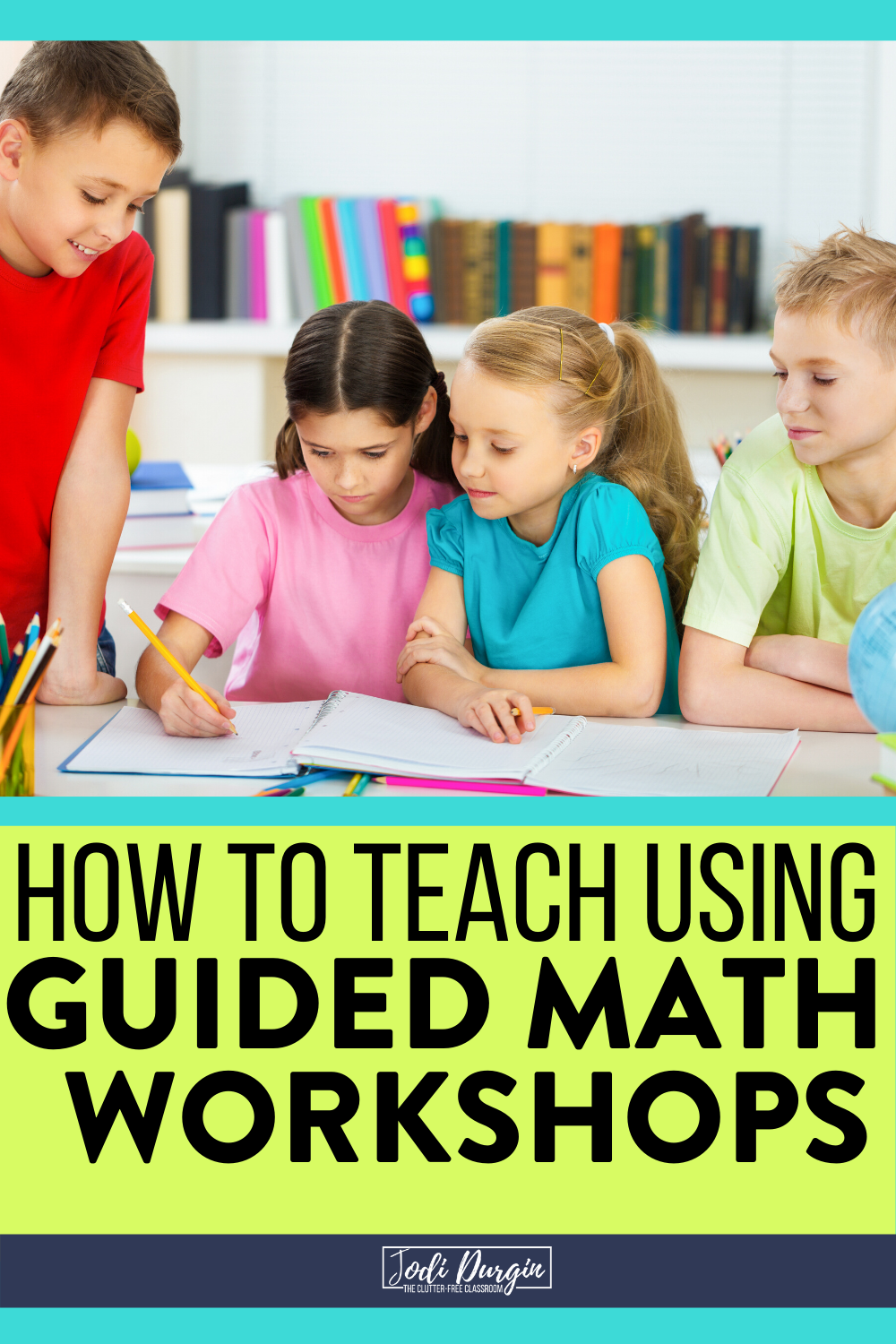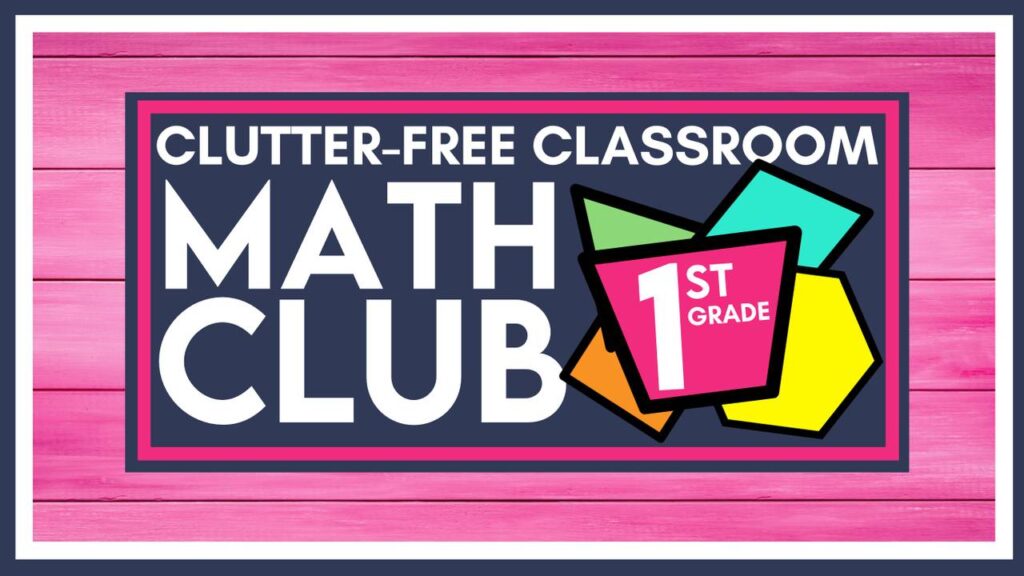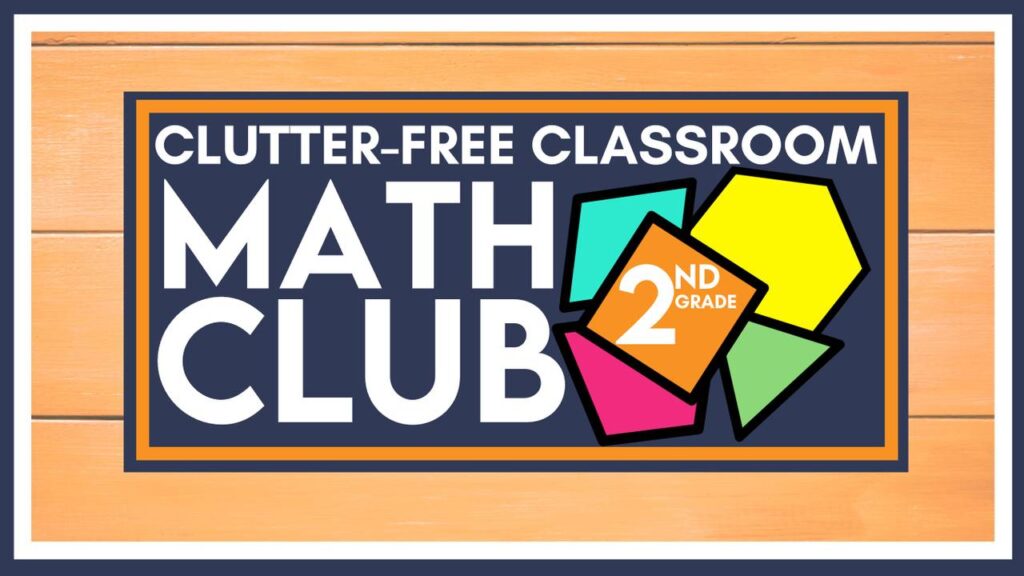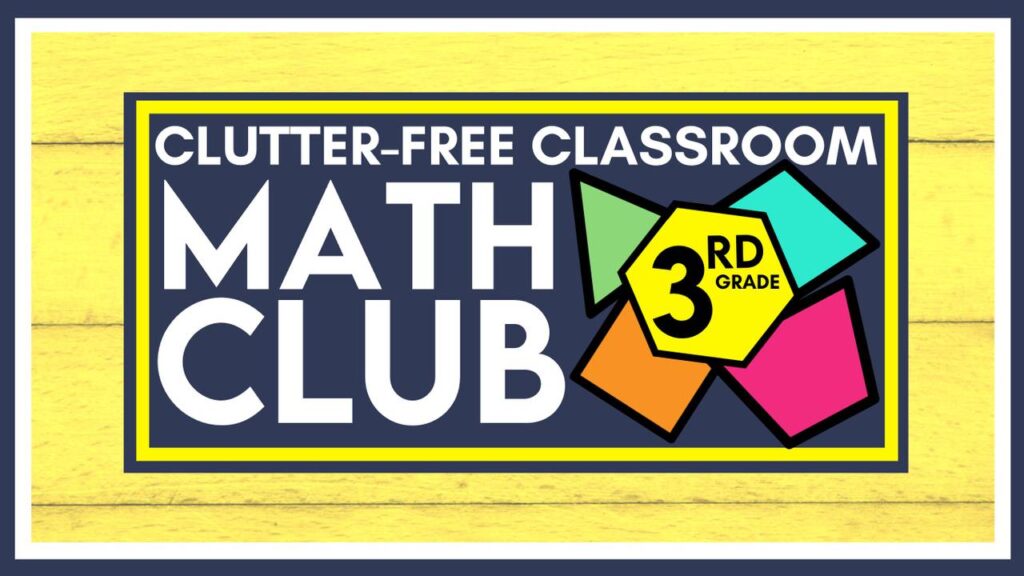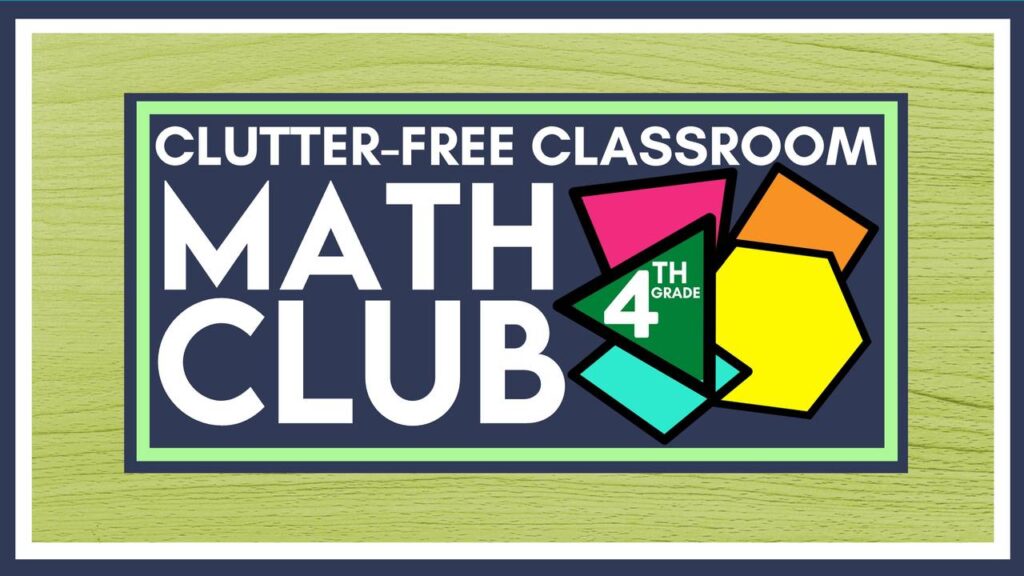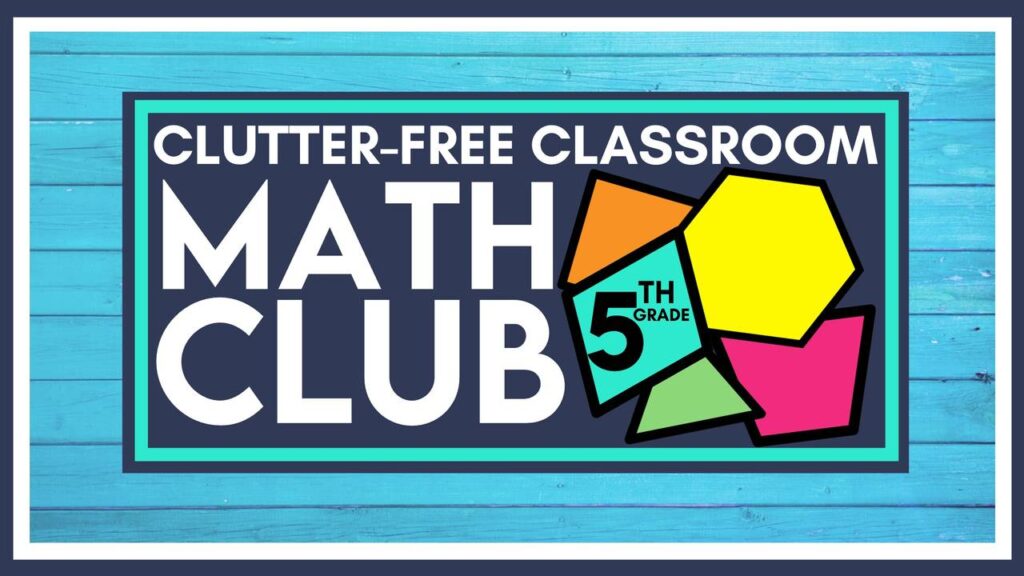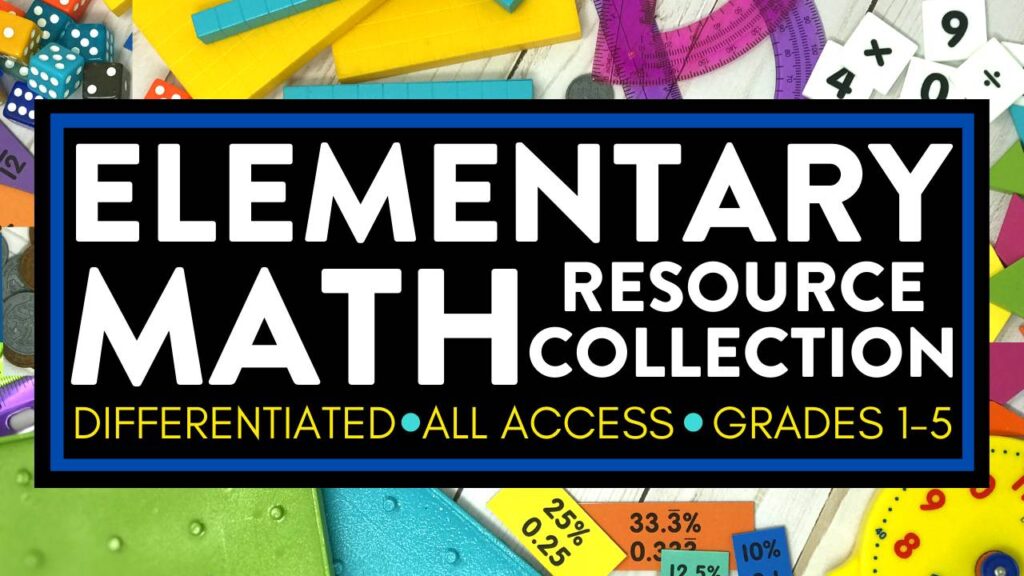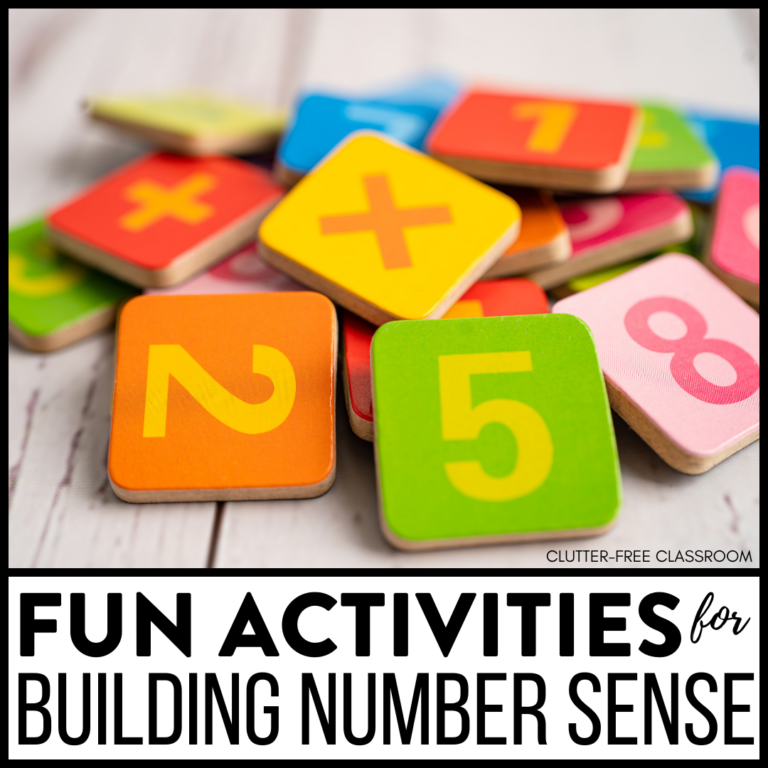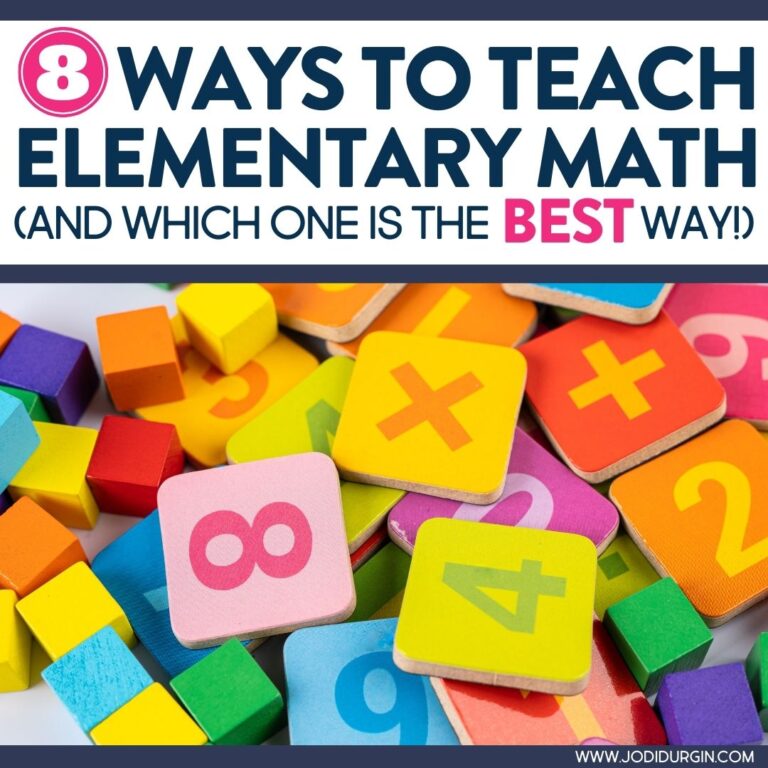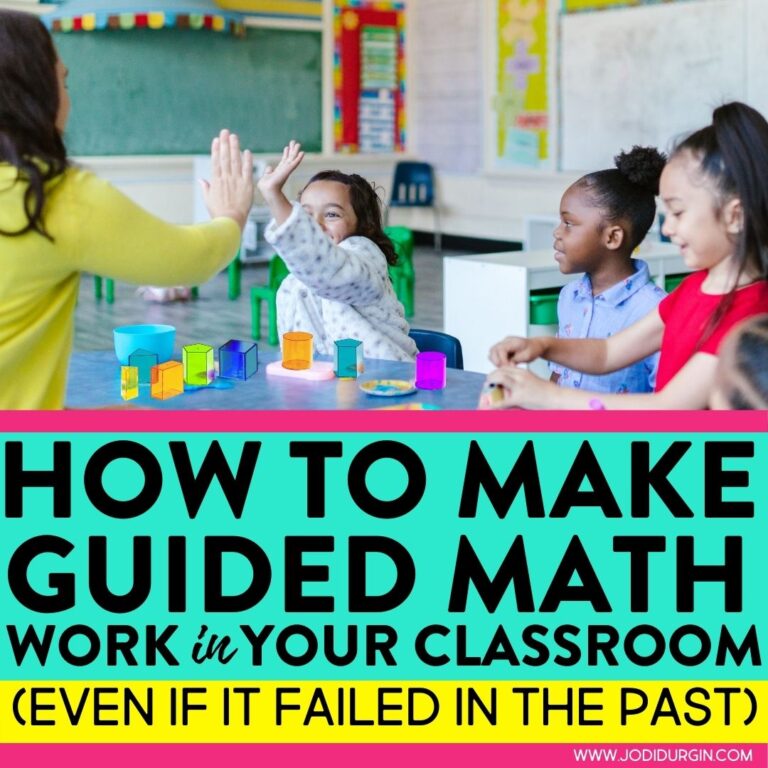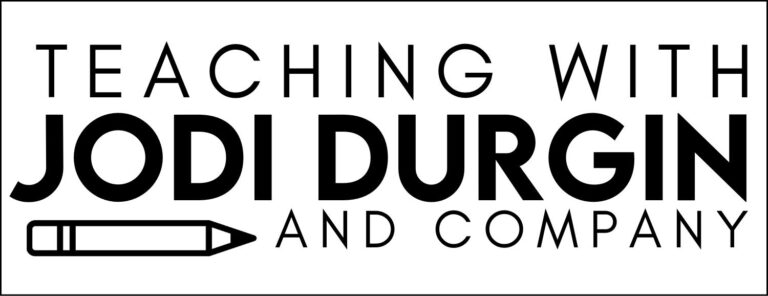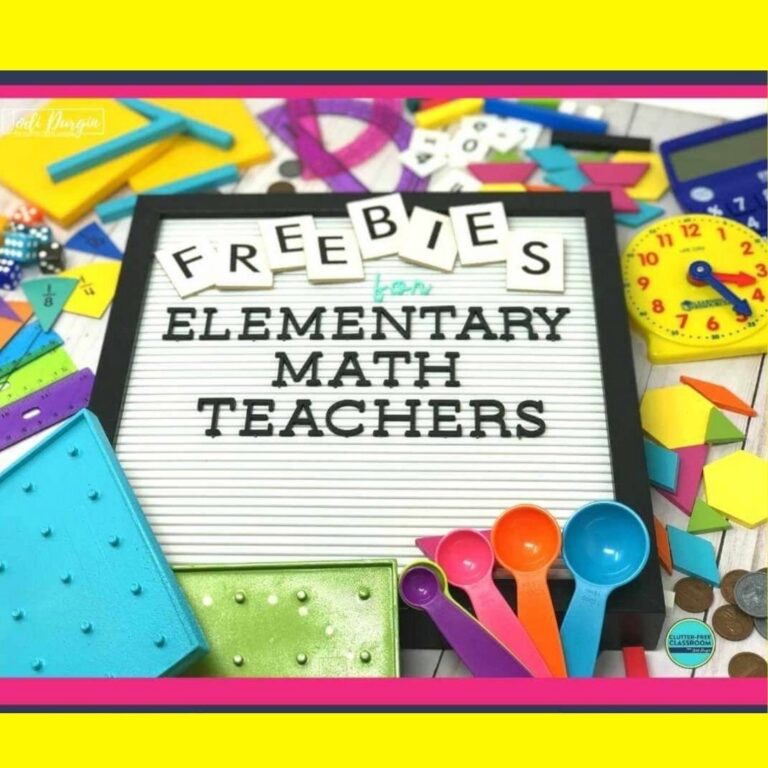Launching Math Workshop is easy when you have a step-by-step process to follow. My Guided Math Workshop course and Guided Math Workshop eBook are great resources that walk you step-by-step with implementing Guided Math Workshop in your elementary classroom. Your first days of Math Workshop will be all about setting up procedures and routines, communicating expectations, and laying a strong foundation, which will set you up for success the rest of the school year. Below are some general ideas to consider when setting up Math Workshop that I go into far greater detail in my course and ebook. Read below to get ideas for launching Math Workshop and strategies for implementing Guided Math!
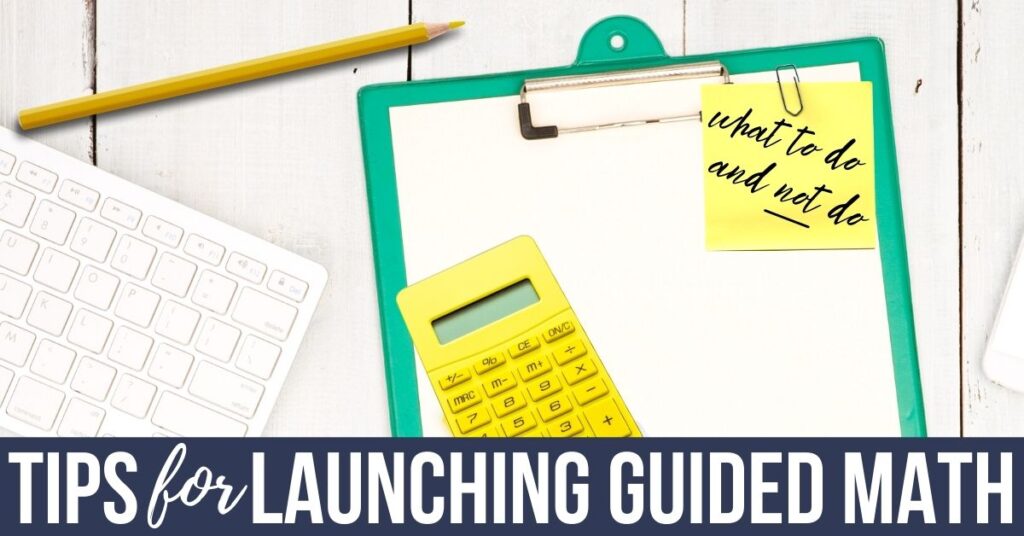
10 Things you Need for Launching Math Workshop
Here are 10 things you need to consider for successfully setting up and launching Math Workshop in your elementary classroom:
1. A Classroom Layout Conducive to Math Workshop
When designing your classroom layout, you need to think about how you and your students will use the space. For example, consider where your whole group area, centers, and small group instruction table will be. Each of these spaces should be thoughtfully chosen. When you are choosing a whole group area location, for example, think about things that you cannot move: Outlets, windows, doors, white boards, interactive white boards, and projectors. If you need help with this, check out my Guided Math Workshop course (coming soon) or Guided Math Workshop guide for a step-by-step guide for how to design your dream classroom that is conducive to Guided Math Workshop!
Here are some questions to ask yourself:
- Where is the best place for my whole group instruction?
- Do I have a space for small group math instruction?
- Do I have tables or clusters of desks that can serve as math centers?
- Where will students be able to work on partner work?
- Where can students work independently?

2. A Numeracy-Rich Classroom Environment
After you have set up your classroom furniture (desks, tables, rugs, etc.), you are ready to take the next step. You’ll want to think of your classroom as a large tool kit for your students. The anchor charts, bulletin boards, and other wall displays (like a math word wall) should support student learning. You can also find more detailed information in my Guided Math Workshop course or Guided Math Workshop guide.
Here are some questions to ask yourself:
- Does my classroom space equally represent literacy and math?
- What visual supports do I have to support students in their math learning?
- Can students access the visual supports from where they will be working in the classroom?
3. A Defined Math Block Structure
Based on the amount of time your school district requires you to teach math and your individual schedule, you’ll need to create a math block structure that encompasses all of the main components of Math Workshop: Mini lesson, rotations, and closing.
Here are some questions to ask yourself:
- What is the total amount of time I have for my math block?
- How long will my mini lesson be?
- How many centers do I want my students to attend per day?
- What amount of time do I want my students to spend at each center?
- How much time do I need for a closing?
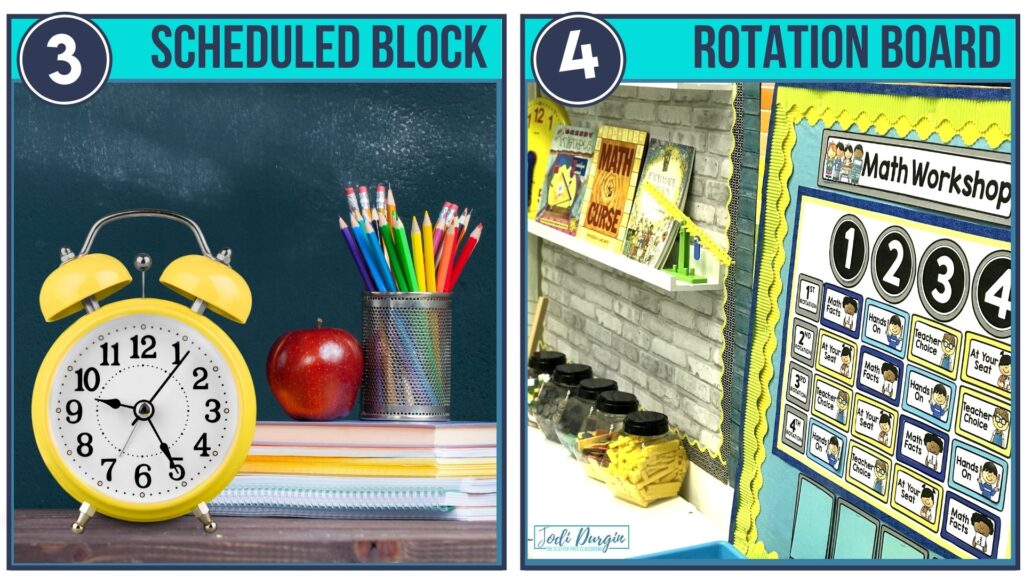
4. A Posted Math Rotation Board
This Guided Math Workshop rotation board will be part of your classroom management plan. It will communicate to students which group they are in, their partners, and what they will be working on that day. You can either post it on a wall in your classroom or project it on your wall. Grab my rotation board in my Math Workshop course or Math Workshop Guide to save you tons of time.
Here are some questions to ask yourself:
- Will I create a Math Workshop bulletin board, or project a digital version on the wall?
- If I am going to use a bulletin board, where in my classroom will I post it?
- What components do I want included on my math rotation board?
5. Established Organization Systems
Classroom organization is always important, but especially when you are launching Math Workshop and implementing Guided Math. Having strong classroom organization systems for math materials, supplies, and tools will set you up for success. When every item in your classroom has a designated spot, it’s a lot easier for you, your students, and the other adults in your classroom to put items away where they belong.
Here are some questions to ask yourself:
- What is my system for organizing my math teaching materials?
- Where will I store my extra math manipulatives?
- Will my students use individual math tool kits or community supplies?
- Where will I store my math centers?
- How will I organize my math lesson plans?
- Which materials do I need to be accessible to me only?
- Which materials need to be accessible to both me and my students?
- Are there extra materials that can be stored away until later in the school year?
- Where will I store my extra materials?
- What types of containers will I use to store my materials?

6. A Thorough Classroom Management Plan
As you know, classroom management is another key to teaching success. It’s important to have procedures and routines in place at the start of the year, so that your room runs smoothly all year long! I always recommend writing down every procedure and routine, so you can be sure you don’t miss a thing. This is especially helpful when setting up a Math Workshop in your classroom. Being proactive will make life so much easier!
When students know what is expected of them, they are more likely to behave appropriately. Expectations, procedures, and routines should be taught at the beginning of the year, reinforced throughout the year, and retaught as necessary. You could argue that those first 20 days of Math Workshop are the most important!
Here are some questions to ask yourself:
- Will you create the Math Workshop rules and communicate them to your students, will they create them, or will you create them together?
- What are the Math Workshop rules and expectations for how students will participate during whole group instruction?
- How do I expect students to behave when they are working with a partner or small group?
- How will I get students’ attention when they are collaborating with a partner during whole group instruction?
- What will the seating arrangements look like during whole group instruction?
- When will students be allowed to use the bathroom during the math block?
- What are the expectations for cleaning up at the end of a rotation?
- How will students know it is time to transition to the next center?
- What will students be expected to do as soon as they arrive at your small group table?
- What should students do if they have a question, but you are meeting with a small group?
- How will I collect exit tickets at the end of the lesson?
- Where will students keep their unfinished work?
7. A Consistent System for Lesson Planning
Having a Math Workshop lesson plan template is a big time saver when lesson planning. I include my favorite lesson plan templates in my guide, but you can create your own to fit your needs. Keep it simple, but be sure to include the most important components (lesson objectives(s), essential question(s), standard(s), etc.).
In addition to having a lesson plan template, it is helpful to have a consistent time and place to lesson plan. This ensures you have all of the resources you need at your fingertips so you can sit down and plan without interruptions.
Here are some questions to ask yourself:
- Do I have a Math Workshop lesson plan template?
- If not, what components do I want to include in my Math Workshop lesson plan template?
- Do I have a small Guided Math group lesson plan template?
- If not, what components do I want to include in my Guided Math lesson plan template?
- What types of mini lessons will I deliver during Math Workshop?
- What types of activities will I use for each of the four centers?
- Do I have a list of formative assessments I can pull from?
- Where do I plan for math?
- When do I plan for math?
- What do I need to plan for math?

8. A Plan for Forming Groups and Partnerships
One of the components of Guided Math Workshop is flexible leveled grouping. I recommend dividing students into four groups based on their proficiency on the standard or topic you are working on. It will make it so you can meet students’ needs in your small Guided Math group.
Here are some questions to ask yourself:
- How will I collect student data during small group instruction?
- How often will I assess students?
- What types of assessments will I use?
- How will I group students?
- About how many students do I want to have in each group?
9. An Abundance of Math Resources
Every elementary classroom needs tons of math manipulatives (base ten blocks, money coins, snap cubes, unifix cubes, counters, pattern blocks, small clocks, etc.). What each classroom needs is based on the students’ grade level. Math manipulatives are so important because they help students build a conceptual understanding of the concepts and skills they are learning. In addition to manipulatives, elementary classrooms need to have math read alouds, math games, and activities that are appropriate for their grade level. You can never have enough math resources!
If you need printable and digital math resources for your classroom, then check out my math collections below!
Here are some questions to ask yourself:
- Do I have all of the math manipulatives I need?
- If not, where can I find free printable math manipulatives?
- Do I have enough math games?
- Where can I borrow math read alouds?
- Do I have resources for math homework?
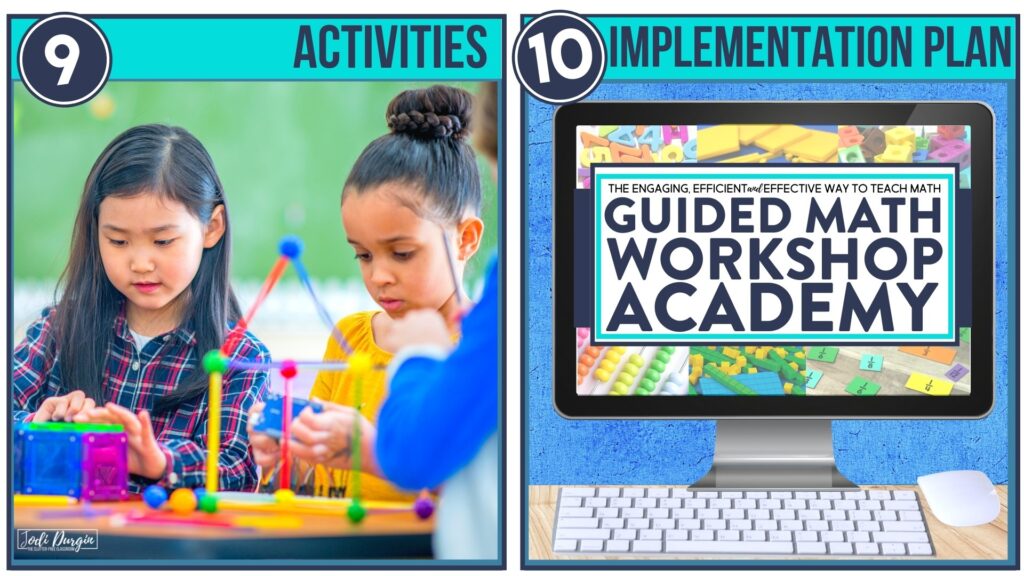
10. A Proven Plan for How to Launch It
There are so many procedures and routines you need to teach your students at the beginning of the year. Those first couple of weeks are critical for the success of your math workshop. In my Guided Math course and Guided Math guide, I have lesson plans for the first two weeks of Math Workshop written for you. They are ready to be printed – it’s a big time-saver! In addition, I walk you step-by-step with how to set up your classroom for Guided Math Workshop covering topics like management, organization, and much much more.
Here are some questions to ask yourself:
- Where do I begin?
- What steps do I need to take to launch Guided Math Workshop?
- What resources can I use to help me successfully launch it?
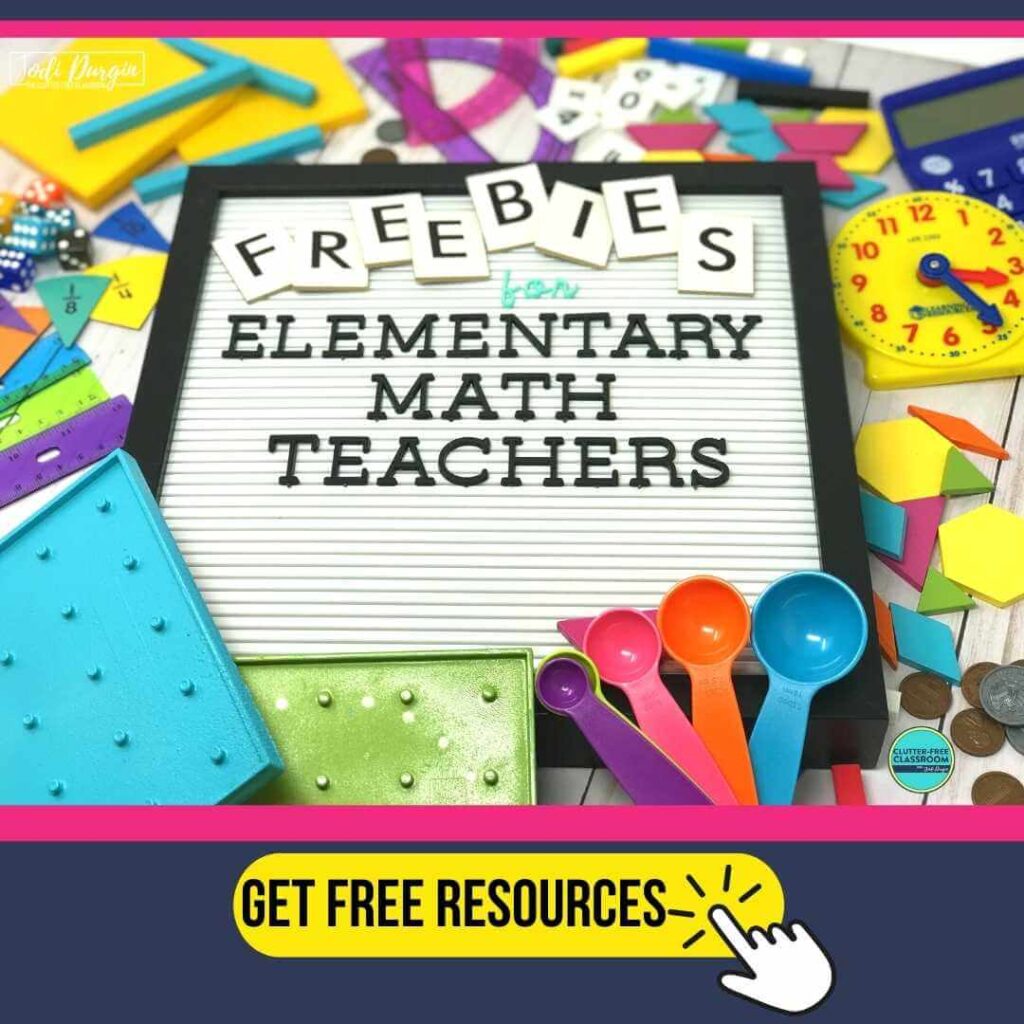
Try a Collection of our Math Resources for Free!
We hope this information about launching Math Workshop and implementing Guided Math is helpful and would love for you to try these math resources with your students. They offer elementary students opportunities to practice grade level concepts and skills in fun and engaging ways. You can download worksheets specific to your grade level (along with lots of other math freebies) in our free printable math resources bundle using this link: free printable math activities for elementary teachers.
Check out these other math resources!
- 1st Grade Math Resources
- 2nd Grade Math Resources
- 3rd Grade Math Resources
- 4th Grade Math Resources
- 5th Grade Math Resources
